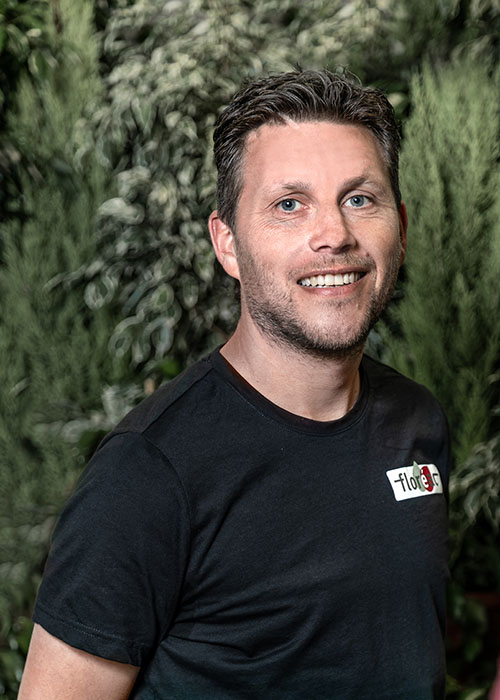Receiving all goods is a vital link in the logistics process. If there is a hitch here, it affects the rest of the chain. This process is different in Belgium than in the Netherlands. But the result is the same: only products that meet all the conditions leave here for their destination. Maikel Vlaeminck (team coordinator reception, Belgium) and Rokus Kester (foreman logistics, Netherlands) give a look behind the scenes.
Can you describe what happens on service reception?
Maikel: “To sum up: here we do the checking and registration of all plants delivered by the suppliers. In Belgium, those deliveries mainly come in at night. When we arrive in the morning, we check the quality of the plants and whether what we ordered has actually been delivered. Is the right article with the right dimensions in the right packaging? For example, if we have ordered white two-branch orchids with a length of 90 cm, they must be on the tray. The quantity must also be correct.
Some growers do this identification themselves. If not, we apply a tray sticker with all the details. With this tray sticker, colleagues can quickly identify the plants to further distribute them per customer order later. This way we check every cart.
Once the check is over and we are sure that all the requested products are present, we register the data in our IT system. In Belgium this is SAP, in the Netherlands Match-online. After this, nothing more can be changed. If we register a cart with orchids and there are azaleas on it, the system stubbornly keeps saying there are orchids on it.”
Rokus: “The biggest difference with the Netherlands is that here, deliveries can be made up to 16 hours. This is because most growers in the area are operational.
In our case, the check takes place in three stages. In the first stage, we receive a digital letter on which we can check whether our order matches what the auction delivers. If there are any discrepancies here, we can rectify them at this stage.
In a second stage, we compare what is on paper with what the grower has supplied. Then we scan the letter and link the lots that are on the letter to the lots on the tray and the distribution sticker is printed. Based on this, we do an additional check.
A lot is delivered to us with a consumer sticker. In that case, we check whether the info matches the distribution sticker. If everything is correct, the products are distributed to the right order. For us, these order lines are fixed in advance. Here, too, we differ from Belgium, where we first buy and only then decide which tray goes to which order.”
Why is this phase so crucial?
Maikel: “First and foremost for our customers. They expect their order to be right. That they receive the right variety with the right properties, in the right quantities. And, of course, to a high quality.”
Rokus: “The moment we attach the distribution sticker to a product, there is no turning back. This step drives the rest of the processing.”
Maikel: “I give an example of further processing. If an error happens when checking the height of the plant, it affects the further chain. With us, the computer determines the height of the plant. For example, if an orchid is 90 cm high; then the cart is built up in function of that height. Now suppose that in reality that orchid has a length of 1m20 instead of 90 cm, then we are faced with a problem because the cart is not designed for this.”
Rokus: “Our system is slightly more flexible in this respect. Usually, the builder determines the layout of the cart and so the dimensions are not planned in advance.”
What all do you need to be able to do to work here?

Maikel: “Plant knowledge is a plus but not a prerequisite. Personally, I think it is an added value because if, for example, you cannot distinguish different orchids with the naked eye and you have to fall back on the label every time, you lose valuable time. You also have to be able to work with our IT system. And that requires a number of actions each time, which means there’s a lot on your mind in a short time, especially if you don’t have any experience.”
Rokus: “Plant knowledge is of course necessary for the colleagues who check the quality of plant knowledge. . Because that too is an important criterion when receiving. You have to have an eye for detail. Are the plants of sufficient quality? Do they have the required maturity? If you don’t know what the plant looks like naturally, you won’t recognise the abnormalities either.
Anyway, you do learn that. In the Netherlands, for example, we organise training courses to master this.
In terms of IT, we have a more accessible system in the Netherlands. As a foreman, I also try to standardise as much as possible which limits the number of operations.”
Maikel: “Flexibility is also a great asset. For a 9-to-5 job, this is the wrong place. Not all periods are equally busy and it is difficult to estimate in advance when the peaks are coming. In spring usually, but even then it depends on weather conditions. If the period with frost lasts longer, spring will also be slower to arrive. Christmas is usually also a peak period. But it could also be that a customer suddenly asks for a large order and even then it is all hands on deck. You have to be able to deal with that unpredictability.”
Who are you working with?
Rokus: “We work closely with the suplier support department where all orders are forwarded to growers. Feedback thus reaches us directly.”
Maikel: “Our people also sometimes shift to other departments. When it’s quieter in reception, for example, or when they need extra helping hands elsewhere. It’s interesting because that way you get to know the whole company. Moreover, you experience the importance of your own task.”
What makes this job so fascinating?
Maikel: “The variety. Every day is different and never boring. I find it a privilege to work in an environment with plants, they increase the feeling of happiness. And also the bond with other colleagues makes it nice to work here.”
Rokus: “For me, that’s the challenge of getting everything done on time and being able to start again with a clean slate every morning.”
What challenges do you see for the future?
Rokus: “Goods receipt is an essential link in our logistics operation, where some critical checks and registrations happen that take quite some time. But innovations follow each other rapidly, making that process increasingly smooth.”
It is a challenge to find enough people with the right competences, especially during busy periods.”
Maikel: “We also keep talking to our growers, who can help us make the goods receiving process faster and more efficient. This can be done by even more and better identifying all products as well as communicating in advance which products are on which trolley. For this, we like to look at the Dutch system with distribution stickers. Hopefully we will soon be able to apply that to us as well.”
